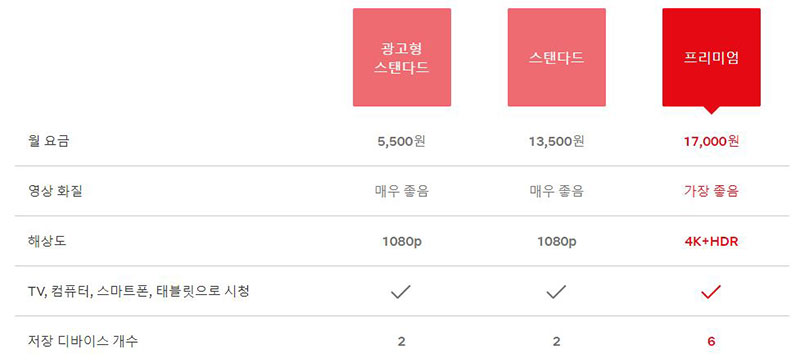미디어 산업의 패러다임을 바꾸는 OTT 서비스 시장이 급성장하는 가운데, 정부가 발표한 ‘플랫폼 경쟁촉진법(가칭)’을 두고 국내 플랫폼 업계가 우려의 뜻을 표하고 있다.

▲넷플릭스 멤버십 가격표
디지털경제연합 온플법 반대 입장문 발표
범플랫폼적 실효성 있는 방안 모색 필요
CP·ISP간 망 사용료 명확한 기준 세워져야
미디어 산업의 패러다임을 바꾸는 OTT 서비스 시장이 급성장하는 가운데, 정부가 발표한 ‘플랫폼 경쟁촉진법(가칭)’을 두고 국내 플랫폼 업계가 우려의 뜻을 표하고 있다.
한기정 공정거래위원장은 12월 19일 윤석열 대통령 주재 국무회의에서 ‘플랫폼 경쟁촉진법’을 추진하겠다고 밝혔다. 해당 제정안은 소수 핵심 플랫폼의 자사우대, 멀티호밍 제한 등 반칙행위를 금지하고, 스타트업의 경쟁력 강화를 골자로 한다.
■ 온플법, 토종 OTT 죽인다?
디지털경제연합은 ‘온플법 제정 반대’ 입장문을 발표하며 강력히 반발했다. 업계 전문가들은 입장문에서 “국내 온라인 플랫폼 시장은 해외 플랫폼 기업과 치열하게 경쟁하는 상태”며, “최근 알리익스프레스(Aliexpress) 국내 이용자수가 2위까지 올라온 마당에 온라인 플랫폼 사전규제는 가뜩이나 어려운 국내 온라인 플랫폼에 사약을 내리는 것과 같다”고 주장했다.
또한 “현재 정부의 기조에 따라 자율규제가 이행되고 있는 바, 섣부른 사전규제는 소비자 물가 상승을 초래하며, 현행 공정거래법이 작동 중임에도 새로운 규제를 도입하는 이중규제로 시장 위축, 행정낭비 등 부작용은 기업과 국민의 부담으로 돌아올 것”이라며 당혹스러움을 표출했다.
이는 EU에서 DMA(디지털시장법)를 도입해 아마존·애플·메타·MS 등을 사전규제한 데서 이어진 정책이다. 그러나 미국은 디지털 패권 경쟁을 위해 산업 보호를 명목으로 플랫폼 관련 법안을 폐기한 만큼 자국의 상황에 맞춘 정책 방향성을 유지하고 있다.
전문가들은 “대한민국은 자국 플랫폼 기업들이 국내 산업을 지켜내고 있는 상황에서 우리만의 해법을 모색해야 하며, 과도한 온라인 플랫폼 규제가 국내 디지털 경제의 성장 동력을 잃지 않도록 신중을 기해야 한다”고 주장했다.
한국방송광고진흥공사에 따르면, 2022년 기준 국내 OTT 시장에 넷플릭스는 38%의 점유율을 기록했다. 이어서 티빙(18%), 웨이브(14%), 쿠팡플레이(11%), 디즈니플러스(5%), 왓챠(3.7%) 순으로 나타났다. 국내 사업자인 티빙과 시즌은 합병을 통해 넷플릭스와 유투브 등에 대항했다. 지난 11월 말 티빙은 웨이브와도 합병을 꾀하고 있다고 밝혔으며, 내년 초 합병 비율을 결정될 것으로 예상된다.
한국방송광고진흥공사 변혜민 연구위원은 “글로벌 OTT 사업자가 국내 점유율을 확대하고 있고, 국내 OTT 사업자도 해외 진출을 위한 움직임을 보이는 가운데, 국내 OTT 사업자의 해외 진출을 지원할 방안이 필요하다”고 말했다.
또한 “글로벌 OTT에 비해 국내 OTT는 투자 규모는 적으나, 콘텐츠 수급비용이 증가됨에 따라 영업 손실이 지속 확대되고 있다”며, “국내 OTT의 생존위기이자 국내 미디어 산업의 위기로 직결될 수 있기 때문에 장기적으로 국내 OTT 사업자를 위한 지원이 필요한 시점”이라고 덧붙였다.
■ 범플랫폼적 실효성 있는 방안 모색 필요
.jpg) ▲한국 철수를 밝히는 트위치 Dan Clancy CEO
▲한국 철수를 밝히는 트위치 Dan Clancy CEO
공정거래위원회는 국산 플랫폼 사업자를 규제하기 이전에 플랫폼으로부터 국내 이용자를 보호할 수 있는 장치를 우선적으로 마련하는 것이 시급하다. 모든 플랫폼 사업자들이 터무니없이 가격을 올리는 것을 규제해야 하지, 국내 플랫폼 사업자의 독주를 막는 것은 후순위다.
소비자는 적절한 가격, 콘텐츠의 유익성, 품질 등에 따라 자유롭게 원하는 플랫폼을 선택한다. 넷플릭스, 웨이브 이용자 A씨는 “플랫폼은 있으면 편하지만, 금액을 내기 부담스러운 선까지 요금이 오르면 해당 플랫폼의 구독을 취소할 의향도 있다”고 밝혔다. 즉 특정 온라인 플랫폼 사업자가 지배력을 남용할 수 없는 상황이다. 정부는 해외 또는 국내 플랫폼에 한정된 규제가 아니라 모든 온라인 플랫폼 사업자들로부터 국내 소비자들에게 납득 가능한 이용 요금, 범위 등 근거를 제공케 하는 방안을 모색해야 한다.
최근 구글은 국내 유투브 프리미엄 가격을 월 1만450원에서 1만4900원으로 43%를 인상했다. 넷플릭스는 동일 가구 거주자가 아닌 경우 계정 공유를 위해 매달 추가로 5천원을 더 지불하게 했고, 광고가 없는 스탠다드 요금제를 선택하려면 최소 1만3500원을 지불하게 됐다. 디즈니플러스도 월 9900원 요금제를 프리미엄으로 구분해 가격을 기존 대비 4000원을 올렸다. 한편 우리나라의 티빙도 기존 베이직 요금제 월 7900원에서 9500원으로 인상했다.
CP(콘텐츠 제공자)들이 가격을 올리는 행위는 시장 경제의 흐름에 따라 콘텐츠 제작비, 망 사용료, 네트워크 수수료 상승 등과 같은 요인 때문에 불가피한 실정이다. 이에 대해 지난 21일 방통위는 사업자별 요금인상 내역, 이용약관, 이용자 고지 등에 대해 전기통신사업법 금지행위 위반 여부를 점검했다.
그러나 글로벌 플랫폼 사업자들이 독과점 구조 속에서 이용 요금을 올려도 자유경제체제에서 정부가 요금을 규제할 수 있는 방안은 아직 미비하다. 따라서 이로부터 플랫폼 이용자들을 보호할 수 있는 실효성 있는 관리 체계가 촉구되고 있다.
예컨대 망 사용료 대가 산정에 대한 명시적 법적 근거를 획득해 망 사용 추이를 파악하고 투명한 기준을 마련하는 것이 방안이 될 수 있다. 망 사용료는 넷플릭스, 구글 등 CP가 ISP(인터넷서비스공급자)에 망 사용에 대한 대가를 지불하는 금액이다. 망 사용료는 OTT 서비스의 가격을 결정하는 중요한 요소로, 이에 따라 소비자에게 돌아가는 비용 부담이 커질 수 있다.
몇 년 전부터 글로벌 CP와 ISP는 갈등을 빚어오고 있다. OTT 사업자는 우리나라 망 사용료가 과도하게 책정되어 있다고 주장하고 있으며, 이동통신사(ISP)는 망 사용료가 정당하다고 주장하고 있다. 인터넷 방송 플랫폼 트위치는 내년 2월 한국 철수의 이유로 망 사용료를 꼽기도 했다. 또한 2020년부터 3년 6개월 동안 SK브로드밴드와 넷플릭스는 망 사용료를 두고 긴 싸움을 벌여왔다. 현재 양사는 파트너십을 맺으며 갈등을 종결했으나, 해당 판결문이 공개되지 않아 업계에서는 SK브로드밴드에게 넷플릭스가 상당한 이익을 취할 수 있는 방안을 제안한 것으로 추측만 하는 상황이다.
현재 국회에 계류 중인 망 사용료 관련 법안은 2020년 12월부터 올해까지 8개가 발의된 바 있다. 그러나 이렇다 할 법안이 나오지 못하고 있는 가운데, 정책 차원에서 명확한 망 이용대가 기준이 마련될 필요가 제기되고 있다. 27일 국회 방송통신위원장 인사청문회에서 김홍일 후보자는 "망 사용료가 과도한 부분이 있다면 시정돼야 할 것 같다”고 말했다.
현재 업계에서 기업 대 기업 간으로 책정돼 불분명한 망 사용료에 대한 기준이 명확히 세워진다면 플랫폼 사업자가 이통사와의 분쟁을 예방하고, 플랫폼 이용자로부터 이용 요금에 대한 공정성을 확보할 수 있을 것으로 기대된다.
.jpg)